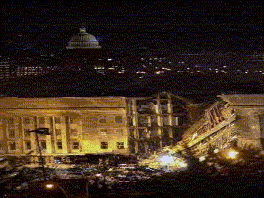Posted on December 31, 2002
Blood-n-Guts Clinton
Confessions of a latent pugilist
by
Daniel Clark
In a December 18th USA Today article on President Bush's order to deploy a national missile defense system, reporter Tom Squitieri wrote that "Bush expanded on the ground-based system envisioned by President Clinton by ordering research and testing of sea-based and space-based add-ons that could be deployed later."

Admittedly, this is far from one of the more egregious examples of pro-Clinton media bias, but it's interesting because it falls within the broader pattern of an effort to rehabilitate Bill Clinton's image as Commander-in-Chief. The suggestion that he had "envisioned" a missile defense system is only the latest in a series of preposterous claims made by and about Clinton over the past year, in an attempt to portray him as a stalwart defender of the United States and its allies.
This effort began in earnest with an August 4th Time magazine article by Michael Elliott, which put forth the incredible assertion that the Clinton administration had devised an attack plan late in the year 2000 that might have prevented the September 11th hijackings. Clinton did not put it into action himself, the story goes, because he didn't think it would be fair to the incoming Bush administration to launch an attack within a month of leaving office. His national security adviser, Sandy Berger, allegedly gave the plan to Condoleeza Rice, who was to hold that same position in the Bush administration. The article implied that Bush was too preoccupied in the early months of his administration to give the plan the attention it deserved. Elliott quotes an anonymous Clinton administration source as saying, "If we hadn't had a transition, probably in late October or early November 2000, we would have had (the plan to go on the offensive) as a presidential directive." Got it? If only Bill Clinton could have remained in the White House, the terrorist attacks on the World Trade Center and the Pentagon might never have happened.
One would think that, if the Clintonites had developed anything as ambitious and comprehensive as a blueprint for the defeat of al-Qaeda, President Clinton would have discussed it with President Bush directly. Instead, it was Richard Clarke, chairman of the Clinton administration's Counter-Terrorism Security Group, who was assigned by Berger to reveal the grand scheme to Rice by way of a Powerpoint presentation. (Gosh, how thorough can you get?) Clarke's proposal to "roll back" al-Qaeda consisted of responsible but modest measures that should have been taken after the first WTC bombing in 1993, like freezing terrorists' assets, and increasing intelligence operations in Afghanistan.
Bill Clinton had no plan that would have prevented the September 11th attacks, and he certainly had no intention of invading Afghanistan to overthrow the Taliban. The idea that America would have been more secure if he could have remained president is pure fiction -- which explains why such an absurd theory should appear on the pages of Time.

That wasn't the only account of Clinton's vigilance against terrorism, though. Another came from a book entitled The Age of Sacred Terror, written by Daniel Benjamin and Steven Simon, both formerly of the Clinton administration's National Security Council. They claim that the former president tried to fight terrorism, but was held back by an uncooperative Defense Department.
The book cites one Clinton idea in particular as a tragically lost opportunity. Just try to imagine the expression on the face of Hugh Shelton, Chairman of the Joint Chiefs of Staff, when the president proposed to him the following: "It would scare the (expletive) out of al-Qaeda if suddenly a bunch of black ninjas rappelled out of helicopters into the middle of their camp. It would get us an enormous deterrence and show those guys we're not afraid."
Benjamin and Simon argue that the Pentagon brass rejected this and other ingenious plans due to their bitterness over Clinton's decision to allow gays to serve in the military. But of course. What other reason could there possibly be?

After the North Koreans admitted that they have been working to develop nuclear weapons, Clinton went roaming the lecture circuit boasting that he had threatened to bomb their nuclear reactor back in 1994. He's actually telling the truth when he says that, but it's far from the whole story. He did order plans to be drawn up for a bombing raid on the reactor, but he withdrew the threat under the unsolicited advice of former president Jimmy Carter. The author of the excessively Soviet-friendly SALT II Treaty took it upon himself to strike a deal with North Korea that made his Cold War negotiations seem shrewd by comparison.
Clinton postponed the inevitable crisis when he accepted the terms of the Agreed Framework Between the United States of America and the Democratic People's Republic of Korea. Under this agreement, North Korea promised to shut down its reactor. In exchange, the United States would provide for the construction of two new light-water reactors, designed to produce non-weapons-grade nuclear material. Those reactors are expected to be completed by 2008. In the meantime, the U.S. is obligated to deliver an annual supply of 500,000 tons of heavy oil "for heating and electricity production."
The Agreed Framework is so timid that it doesn't even discuss the reactor deal in the context of any concern over the development of nuclear weapons. It appears as if Clinton and Carter just assumed that shutting down the reactor that allowed the North Korean government to produce weapons-grade plutonium meant that it had agreed not to try to develop nuclear weapons. Instead, the regime in Pyongyang has continued its nuclear weapons program by purchasing equipment used to enrich uranium.
While failing to significantly impede the Communist nation's nukes program, the agreement fortified its conventional army with those vast shipments of heavy oil. At least you'd have to assume so, judging from our inability to get humanitarian aid through to that country's starving civilian population. It's hardly likely that the heavy oil, which can be used to produce fuel for military vehicles, is instead providing heat for the homes of Korean peasants.
As if that weren't enough, a 1999 congressional report suggests that the light water reactors we agreed to construct won't be so benign after all. The paper, issued by the House North Korea Advisory Group chaired by Rep. Benjamin Gilman (R, N.Y.), claimed that, "Through the provision of two light water reactors under the 1994 Agreed Framework, the United States ... will provide North Korea with the capacity to produce annually enough fissile material for nearly 100 nuclear bombs."

One might argue that Clinton at least delayed North Korea's development of nuclear weapons long enough that we might develop a capable defense in the meantime, if only he'd been in favor of doing that. When Bill Clinton took office, America's missile defense program consisted of two components: the ambitious, primarily space-based Strategic Defense Initiative (SDI) devised by Ronald Reagan, and the smaller, more flexible Global Protection Against Limited Strikes (GPALS) project begun by George H.W. Bush. Since the fall of the Soviet Union, Bush had de-emphasized SDI in favor of his own GPALS, in order to combat less predictable threats from rogue nations, but both programs remained intact when he left the White House.
Clinton's "vision" of a missile defense system was unveiled in 1993, in the form of National Missile Defense (NMD). The only thing he really added to our existing plan was a new acronym. NMD is basically a more modest version of GPALS, in that it is entirely ground-based, whereas the Bush plan was to be supplemented by air and sea defenses.
Whereas GPALS was meant to work in conjunction with SDI, Clinton's NMD was a replacement for both. Thus his "vision" was actually to diminish our efforts to build a missile defense shield. But now that G.W. Bush is trying to basically reinstate his father's plan, and devote the resources to missile defense that Reagan did, news reports are suggesting that it's really an extension of Bill Clinton's plan.

Clinton budgets minimized funding for NMD until 1998, when an independent commission appointed by Congress, and headed by current Secretary of Defense Donald Rumsfeld, reported that rogue nations like Iraq and North Korea were much closer to developing nuclear weapons than previously thought. This information, combined with a successful ballistic missile test launch by North Korea, provoked the passage of the National Defense Act of 1999, which instructed that a ballistic missile defense be deployed "as soon as is technologically possible."
Congressional Republicans should have known better than to leave such a vital part of the bill open to loose interpretation. This allowed Clinton to sign it into law, but return a year later to announce that, in his opinion, the system was not "technologically possible," just because some of the early tests were unsuccessful.
The new legend of Blood-n-Guts Bill Clinton doesn't acknowledge his downsizing, defunding and delaying our strategic missile defense program, though. It only credits him with envisioning a system so far ahead of its time that our technology hasn't caught up yet. Likewise, the legend tells us that: Clinton plotted a course of action that could have prevented the terrorist attacks, but it was never followed through because Bush was uncooperative; he threatened to bomb North Korea's reactor, but didn't have to, because the enemy blinked before the steely gaze of Jimmy Carter; and he cunningly tried to raid al-Qaeda headquarters, but his efforts were stonewalled by vengeful, gay-bashing generals.
... And that's not all! Blood-n-Guts Clinton has even promised to sacrifice his own life while personally, physically, defending the sovereignty of Israel. As president, he never treated Israel as an ally for even a second. He met with Yasir Arafat more often than he met with any legitimate head-of-state, and his aides publicly bragged that they had "snubbed" Israeli Prime Minister Benjamin Netanyahu. But that was when peace in the Middle East was supposed to become the Clinton Legacy. Since that failed, he's instead tried to build his Legacy out of his strangely latent military prowess. In a Jewish charity fundraiser in Toronto on July 30th, he actually said, "If Iraq came across the Jordan River ... I would grab a rifle and get into a trench and fight and die."
Gosh. Who knew he had it in him? What might we learn next about the pugilistic exploits that Bill Clinton has tried or intended to carry out? Perhaps it will be revealed that he'd really meant to go to Vietnam, but that his London-to-Saigon flight was delayed, and it couldn't take off until the fog lifted ... which wasn't until 1974, as it happened.
The Shinbone: The Frontier of the Free Press
Mailbag . Issue Index . Politimals